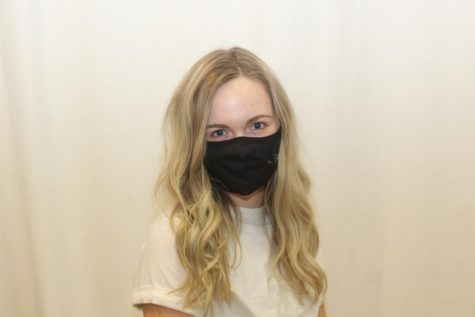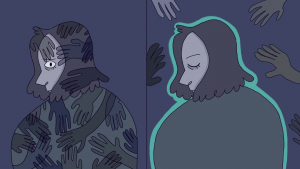STL sex trafficking scandals
Websites such as Backpage have allowed sex trafficking to enter our everyday lives.
*This story contains anonymous sources.
*Katie was on the honor roll at her local high school; many of her peers liked her, but Katie lacked something: a father. He didn’t come home often, but when he did, he did so in a drunken rage. She simply wanted a man to love her and make her feel special, to fill the void she felt inside. At age 19, she met *Derek. They met on Facebook, and Katie immediately fell in love with him. It didn’t take long for Derek to realize how vulnerable Katie was. When they did meet, it was in an empty parking lot. He threatened her into running away from home and forced her to have sex with his friends to pay off his debts. Although it may seem too bizarre to be a local story, Katie was from St. Louis.
In St. Louis, there are multiple refuge houses and programs for sex trafficking victims like Katie. Monarch is an STL based organization that takes recycled jewelry and creates new pieces out of it. They sell the new designs and donate 100% of the profit to refuge homes that support sex trafficking victims like Katie. Jenny Michaud, a Monarch advocate, has worked with countless victims.
“The first time I went [to a refuge house] I didn’t know what to expect, but I saw a 14-year-old girl and a 16-year-old girl,” Michaud said. “[If I had] brought my daughters with me and sat them on a couch with the girls from the refuge, I wouldn’t have been able to tell who was being trafficked. It was eye-opening [for] me. Most people don’t realize that many middle-class families experience trafficking as well as overseas victims.”
According to Michaud, Monarch is primarily based in St. Louis because of trafficking’s prevalence in the area. She believes the location of St. Louis creates an area that is convenient for traffickers to meet, which is a primary reason why sex trafficking is so prominent.
“The way our interstates run, St. Louis is a central hub for traffickers to meet from coast to coast,” Michaud said. “Our law enforcement is dedicated to identifying victims on the streets. The goal of the police department’s task force is to prevent trafficking victims of the past from being stuck [there].”
Since 2007, 1,198 sex trafficking cases have been reported in Missouri to the National Sex Trafficking Hotline. This website classifies victims as any individuals forced into sex trafficking, regardless of their age. In 2012, 48 victims were identified, yet in 2019, 114 victims were identified. This leaves a victim count increase in Missouri of 237% over the past seven years. Due to this increase, the St. Louis police force created a sex trafficking task force to combat this issue. Michaud said this is a great first step, but much more is needed to tackle trafficking.
“I think the police department should spread awareness to children, rather than avoiding the conversation,” Michaud said. “We need to educate our children on social media use and how to tell signs of potential danger or grooming. Although it’s controversial, children should begin learning about trafficking at the age of 11 because the average age children are brought into trafficking is 13, and we need to prepare them for that.”
The Polaris Project, a public national sex trafficking statistic base, cannot rank Missouri on their trafficking scale because victims are only considered “victims” in court if they are under the age of 18. Michaud believes this adds to the stigma of people viewing victims as prostitutes and hopes Monarch can help change that perspective.
“Each time someone purchases a gift, we also send a card with it that has a note describing how their purchase has a purpose and provides hope for victims of trafficking,” Michaud said. “We emphasize the symbolism of how the original jewelry [used] was thought of as ‘trash,’ but then created a beautiful piece. Many girls feel this way when they are rescued, but we hope our funds will [give them the resources to] help them feel beautiful again.”
Katie felt this way before she was rescued from the sex trafficking industry. She said the manipulation she faced made her feel like she didn’t deserve saving.
“[Derek] told me he loved me, but he got so angry with me for the smallest things, like if I accidentally left clothes in the washer for too long,” Katie said. “He also had this thing about leaving the toilet seat up. If I left it down, he would be furious and threaten to leave me on the streets. [He’d tell me] my mom was upset with me for moving out, so I had this thought that she wouldn’t want me back home.”
According to Katie, she believes she developed a form of Stockholm syndrome, which is when a victim of abuse or kidnapping develops affection for their abuser. Katie said these feelings progressed out of fear of Derek hurting her or her loved ones.
“I was terrified to leave him,” Katie said. “I was scared [of] what he would do to me or my family, but I was more scared about losing him. He was the only person who had ever made me feel special, and it was twisted but I didn’t want to lose that.”
David Nash, St. Louis sex trafficking task force officer, has worked with multiple victims of sex trafficking in the St. Louis area. According to Nash, several of them have stories similar to Katie’s — stories full of manipulation and fear of coming forward. Nash said this fear is what makes the police’s job so difficult.
“We do everything we possibly can,” Nash said. “It is crucial for the public to report anything they think is wrong. They could be saving someone’s life without even knowing it.”
Katie now has a stable job and works with other victims of sex trafficking to help them get back on their feet and recover from the trauma they’ve been put through. She hopes that she can use her experience for good to save others from being trapped in the trafficking industry.
“If I can help [anyone] with my story, I want them to know that they will survive this, even if it seems like all hope [is gone],” Katie said. “There is a future for you, you are not lost.”
If you or anyone you know is suspected of being involved in the sex trafficking industry, call the National Sex Trafficking Hotline’s 24/7 number: 1-888-373-7888.
Your donation will support the student journalists of Kirkwood High School. Your contribution will allow us to purchase equipment and cover our annual website hosting costs.

she/her
Favorite musical artist: Post Malone
Favorite quote: "Yeah, you pulled an all nighter. An all nighter in bed." - Tom Mueller
Favorite...

Interests: I love art and spending time with my nieces and nephews!
Favorite musical artist: Conan Gray.
Favorite quote: "You have the moral backbone...












